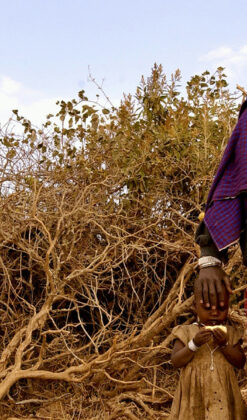By Brandon Stiver. Learn more about Brandon here and get help to transform your orphanage here. This blog post is the third in a four-part series. Read Part One here; read Part Two here.
Our family returned to Tanzania in January 2014 with a different nonprofit than before. The thrill of being a single missionary and then a missionary couple was brought to another level with our toddler in tow. I distinctly recall, within that first month of having returned to Africa, driving up a road in our neighborhood and thinking incredulously, “I can’t believe I brought my daughter here.” In Tanzania, there is widespread poverty and gaps in health care and food security. While our family, as Western-funded missionaries, would be afforded much more margin than our Tanzanian neighbors, we would nonetheless be subject to some of the same challenges. (Our little girl would go on to break two bones in Tanzania, and our experience getting medical help was quite an ordeal!)
We settled into a new ministry handed to us by our new organization: providing support for the children in a local foster home while pursuing ways to multiply foster and adoptive families in the area. Like any good missionary, we looked to partner with the local church in order to find potential families.
For better or (many times) for worse, Tanzanian pastors are very open to having guest preachers from the U.S. speak at their churches. This eagerness to have Americans share is undoubtedly a combination of different factors: true African hospitality, plus post-colonial power disparity, plus social deference, plus the pursuit of financial support. Whatever the cause, it was not difficult for me to reach out to my Tanzanian colleagues to land some preaching opportunities. My message was easy and straightforward: “Scripture points us towards caring for orphans through family care; let’s go and do it.”
What was neither easy nor straightforward was the response. I tend to lead with naïveté. I thought for sure that the Word would be preached and the foster families would line up. But it just doesn’t work like that, not in the U.S. or in Africa. I found that church after church was open and receptive to the message, but seemingly few people opened their homes.
Here’s the good news, though. Remember how I mentioned in my last blog post that most orphans still have biological family members nearby? This means most orphans don’t need to enter another family through foster care and adoption. It is true that some children need temporary foster care or permanency through adoption, but they are a minority within the overall population of vulnerable children.
As we established our new program, Kingdom Families, we came to the realization that partnership with the Tanzanian church was not to be a recruiting mechanism; rather, it was to be the core of our ministry. While some international organizations build up substantial social services to meet the immediate needs of vulnerable children and families, God was calling us to a different ministry: the ministry to bolstering the local church to meet the needs of their own communities and help kids stay with their families. We kept our social services department small rather than increasing our long-term caseload.
For example, a pastor in our network contacted us to share about a family from his church that was in a vulnerable position. The father had a job that required him to clean carrots in a local water source. Tragically, he contracted a water-borne illness and suddenly passed away, leaving his wife and three children behind.
Urgent situations like this sometimes lead vulnerable mothers to relinquish their children to orphanages. The dire nature of the situation compelled this pastor to reach out to Kingdom Families for support. We deployed a local staff member to meet with the mother and assess her family’s needs. Together, we came up with a short-term plan to help her stabilize. This looked like relational support from our staff and the pastor’s family, coupled with short-term financial support to meet three needs: three months’ rent, groceries, and capital to start her own business. The intervention we provided through her local church took place over three months and cost us about $300. During that time, her sister moved in from the village to help with the little ones, and she got her business up and running.
This was not a perfect solution, but it was better than the alternative. Rather than making this mother utterly destitute or sending her kids to an orphanage to get their basic needs met, we stabilized the family with tangible needs and relational interventions for a fraction of the cost. (Remember my former orphanage’s operating cost?) This wasn’t perfect, but it was better.
God has continued to give me opportunities to work alongside the Church to meet the needs of vulnerable children and families. When I first returned to the States five years ago, I worked for a child welfare agency in California, and I specifically focused on church partnerships to recruit and develop foster and adoptive parents. I was successful in that I was able to find and support the sliver of a percentage of the Christian population called to be foster and adoptive parents. At the same time, I came across so many more people who wanted to help but weren’t positioned to welcome a child into their home. This lack of other viable onramps to support vulnerable children and families has led me to now focus on helping churches engage in ways that anyone and everyone can do.
Today, I direct the Seattle/Tacoma operation for CarePortal, a care-sharing technology that drives action for local kids and families in crisis. We connect the local church with vetted needs of vulnerable children in our own community, and we’re actually doing this in over 30 states nationwide. The story I shared above about a vulnerable widow trying to care for her kids in northern Tanzania is like thousands of stories happening in every community today. In each of these stories, it really should be the church that steps in and provides support.
My dream for orphans and vulnerable children today is a far cry from the dream of my youth, when I was focused on my individual calling to run an orphanage and be kids’ primary support system. As I’ve started to recognize the role of the church and other community members, the value of supporting families and keeping them together has become more clear and more reasonable. It has gone from something I feel I have to do out of a sense of divinely mandated obligation to something that we get to do as a church and as a community. We get to care for and support children and families. It’s not easy, and it’s not always straightforward, but it’s good.











